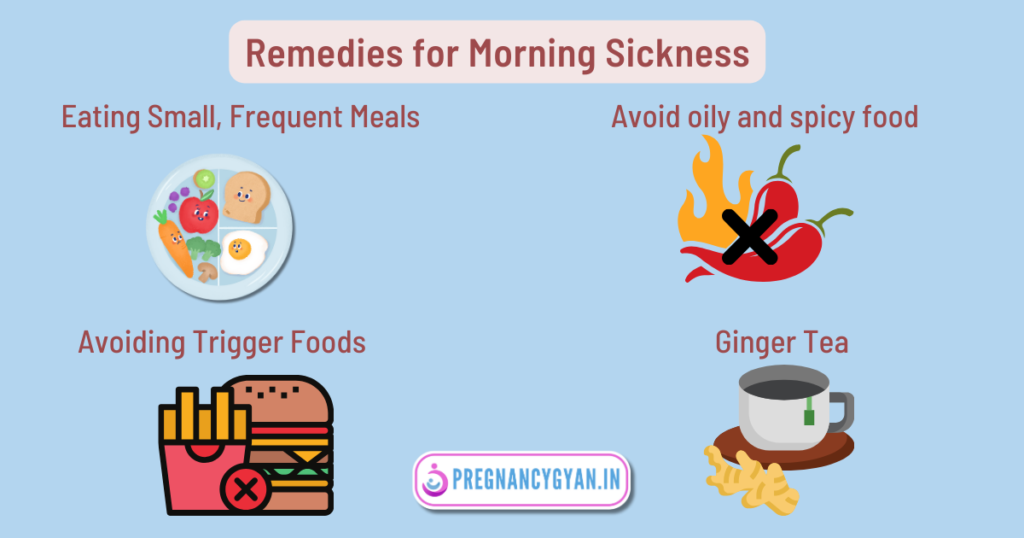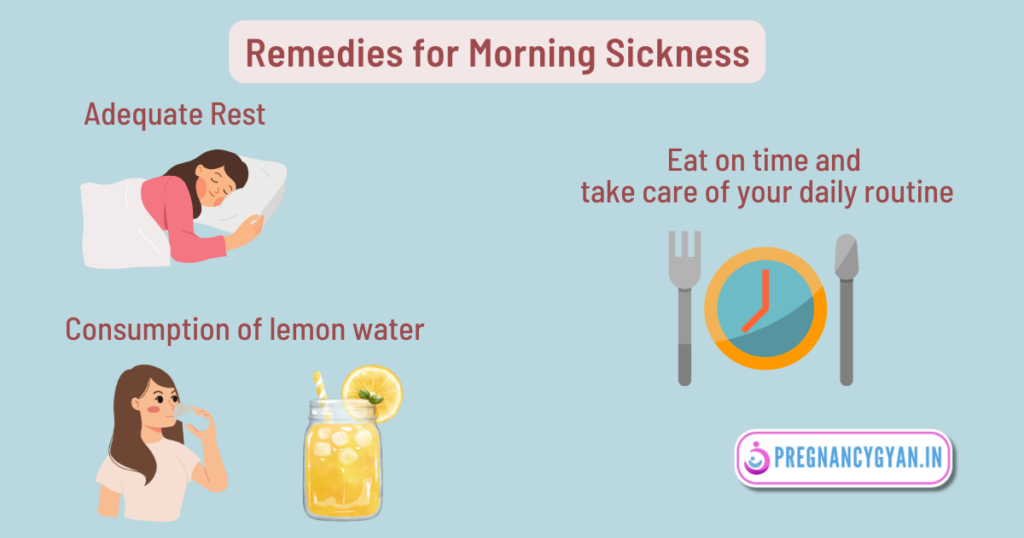इस ब्लॉग को हिन्दी मे पढ़ने के लिए यहाँ क्लिक करे।
Introduction
Pregnancy is an amazing journey full of joy and excitement. However, for many women, it is also accompanied by some discomforts, and one of the most common ones is Morning Sickness. This blog post aims to provide comprehensive information about Morning Sickness in pregnancy, including its causes, remedies, and answers to frequently asked questions.
What is Morning Sickness?
Morning sickness refers to the nauseous feeling that many pregnant women experience, usually during the first trimester (first three months of Pregnancy). Despite the name, it can occur at any time of the day. It affects approximately 70-80% of pregnant women to varying degrees. The exact cause of Morning Sickness is not fully understood, but hormonal changes, such as increased levels of Human Chorionic Gonadotropin (hCG), are believed to play a significant role.
Causes of Morning Sickness
- Hormonal Changes: Fluctuations in hormone levels, particularly hCG, can trigger nausea and vomiting.
- Increased Sensitivity to Smell: During pregnancy, women often have an increased sense of smell, and certain odors can trigger nausea.
- Elevated Estrogen Levels: High levels of estrogen during pregnancy can also contribute to Morning Sickness.
- Stress and Emotional Factors: Emotional stress and anxiety may worsen morning sickness symptoms.
Risk factors for Morning Sickness
Anyone who is pregnant can get morning sickness, although the following women may have an increased risk of morning sickness:
- If a woman has a disease like migraine (a type of headache) or motion sickness (vomiting during a long journey) before becoming pregnant, then the chances of getting morning sickness increases.
- Have a history of morning sickness during a previous pregnancy.
- Being pregnant with twins or multiples.
Remedies for Morning Sickness
While morning sickness can be challenging to manage, there are several remedies and lifestyle changes that can help alleviate the symptoms. It’s important to note that what works for one woman may not work for another. It’s a matter of finding what brings relief for you personally. Here are some common remedies:

- Eating Small, Frequent Meals: Consuming small, frequent meals throughout the day can help keep your stomach from becoming empty, which may trigger nausea.
- Avoiding Trigger Foods: Identify foods or smells that trigger your morning sickness and avoid them.
- Avoid oily and spicy food. You can eat soft foods like plain baked potatoes, bananas, rice, dry toast, eggs.
- Ginger: Ginger has long been used to relieve nausea. Try ginger candies or ginger tea.
- Adequate Rest: Getting enough rest and sleep can reduce feelings of fatigue and alleviate morning sickness symptoms.
- Consumption of lemon water: To get relief from morning sickness, you can drink lemon water on an empty stomach. Lemon increases the amount of Vitamin C, which helps in reducing vomiting.
- Eat on time and take care of your daily routine: To avoid morning sickness, you should pay attention to your eating time and complete your daily routine on time. Eating at the same time every day reduces the risk of vomiting.

When to Consult a Doctor?
Contact a doctor if any of the following applies to you:
- No urination or very little and dark colored urine.
- You are not able to eat or drink anything without vomiting.
- When you stand up, you feel dizzy or faint and your heart starts beating faster.
Precautions to be taken during morning sickness:
- Avoid using medicines without doctor’s advice: Avoid taking medicines for morning sickness without doctor’s advice. Using medicines without doctor’s advice can cause harm to you and your baby.
- Consult a Doctor: Pregnant women should consult a doctor if they experience morning sickness, especially if there is excessive vomiting.
- Protect yourself from direct sunlight: Excessive exposure to direct sunlight especially during the afternoon should be avoided during pregnancy. As it can cause dehydration and worsen the symptoms of Morning Sickness. Use protective sunglasses and clothes to cover the whole body while going out in the afternoon.
Conclusion:
Morning sickness is a common and temporary part of pregnancy that affects many women. While it can be uncomfortable, it rarely poses a risk to the baby. Understanding the causes and implementing remedies can help manage the symptoms and make the experience more bearable. Remember, every pregnancy is unique, so consult with your healthcare provider for personalized advice and support during this remarkable journey.
Frequently Asked Questions
What is morning sickness?
Morning sickness is a common pregnancy symptom characterized by nausea and vomiting, typically occurring during the early stages of pregnancy, often in the morning but can happen at any time of day. It is believed to be caused by hormonal changes in the body and usually subsides after the first trimester or first three months of pregnancy.
How long will morning sickness last?
Morning sickness typically lasts for the first trimester of pregnancy, which is roughly the first 12 to 14 weeks. However, its duration can vary from woman to woman, with some experiencing symptoms for a shorter period, while others may continue to have morning sickness beyond the first trimester.
How to stop morning sickness?
To alleviate morning sickness, try these methods:
1. Eat small, frequent meals to maintain stable blood sugar levels.
2. Stay hydrated by sipping on water or ginger tea.
3. Avoid triggers like strong odors and spicy or greasy foods.
4. Get adequate rest and manage stress.
5. Ginger supplements or ginger ale may help reduce nausea. If symptoms are severe, consult a healthcare provider for additional guidance and potential medications.
Is morning sickness harmful to my baby?
In most cases, morning sickness is not harmful to the baby. It is a normal part of pregnancy, and the baby continues to receive the necessary nutrients. However, if you’re experiencing severe and persistent vomiting, it is important to consult your healthcare provider.
Can I take medication for morning sickness?
Yes, you can take medication for morning sickness, but it’s important to consult your healthcare provider before doing so. They can recommend safe and effective options like vitamin B6 supplements or anti-nausea medications if necessary. It’s essential to discuss your specific symptoms and medical history to determine the most suitable treatment approach.
Does morning sickness indicate a healthy pregnancy?
Yes, experiencing morning sickness is often considered a positive sign of a healthy pregnancy. However, the absence of morning sickness does not necessarily indicate any problems.
Can I prevent morning sickness?
While it is challenging to prevent morning sickness entirely, adopting healthy lifestyle habits such as eating small, frequent meals, staying hydrated, and managing stress can help reduce the severity and frequency of symptoms.

